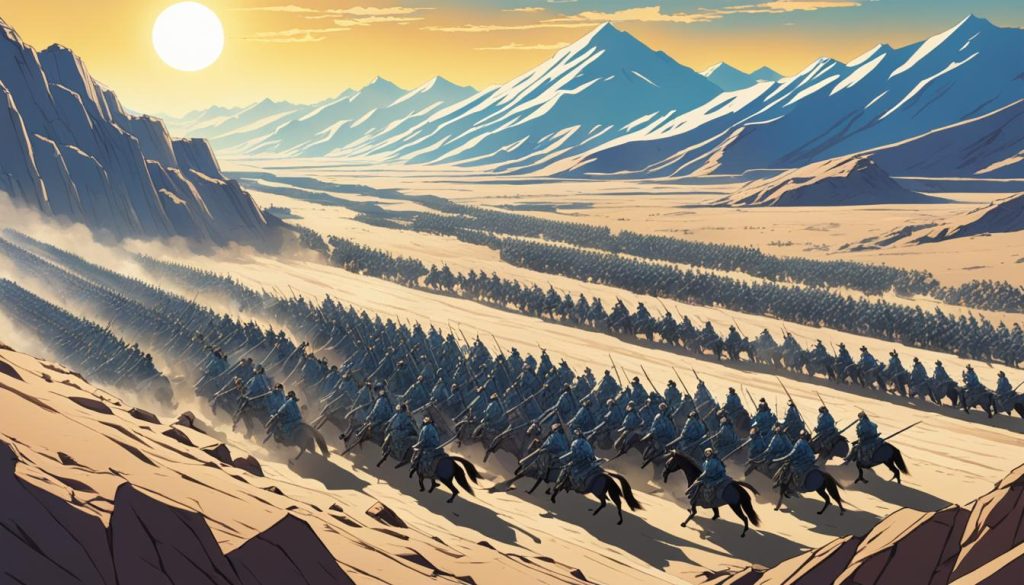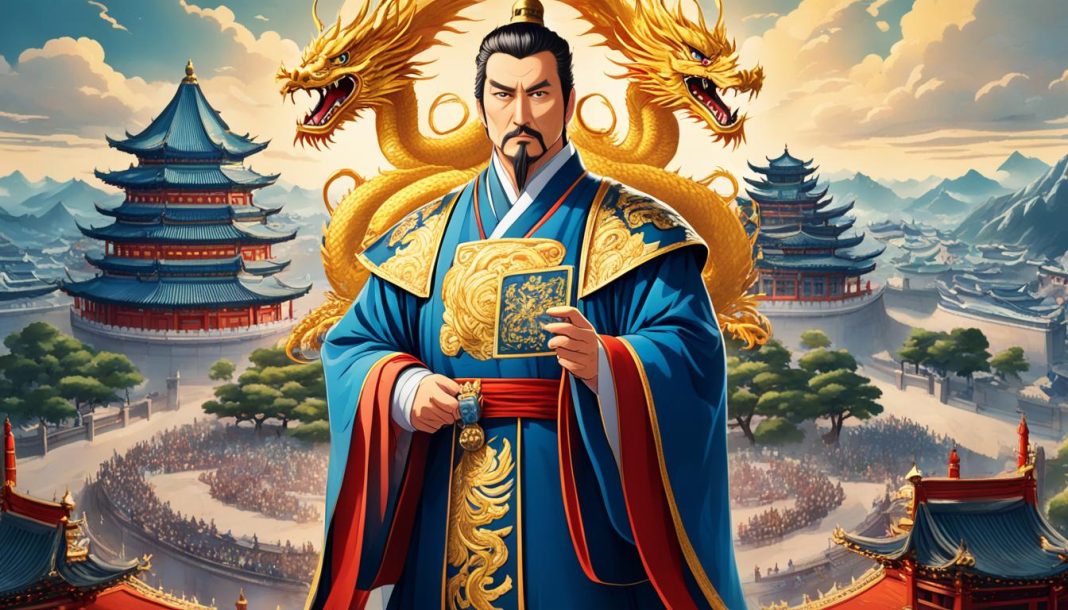- Emperor Han Wu Di, also known as Emperor Wu of Han, was a pivotal ruler of the Han Dynasty in ancient China. His reign, from 141-87 BCE, marked the completion of the political and intellectual structures that formed the foundation of the imperial state of China. Emperor Han Wu Di’s achievements and legacy continue to shape Chinese history, making him a visionary leader of his time.
Key Takeaways:
- Emperor Han Wu Di was a pivotal ruler of the Han Dynasty in ancient China.
- His reign marked the completion of the political and intellectual structures of the imperial state.
- Emperor Han Wu Di’s achievements continue to shape Chinese history.
- He was a visionary leader who left a lasting legacy.
- Stay tuned to learn more about Emperor Han Wu Di’s reign and his significant contributions to Chinese history.
The Reign of Wu-Di, 141-87
Emperor Han Wu Di’s reign was a significant period in Chinese history. During this time, the political and intellectual foundations of imperial China were essentially completed. Emperor Han Wu Di’s long reign allowed for the establishment of the patterns that defined China’s imperial state. The historian Sima Qian, who chronicled this era, played a vital role in shaping our understanding of ancient China. Emperor Han Wu Di’s reign is considered the end of ancient Chinese history and the beginning of a new era.
Emperor Han Wu Di, also known as Emperor Wu of Han, was a pivotal ruler of the Han Dynasty in ancient China.
The Paradox of Wu-Di’s Policies
Emperor Han Wu Di, a prominent ruler of the Han Dynasty and an influential figure in ancient China, implemented ambitious policies that had both positive and negative outcomes. His strong leadership and restructuring of the government and economy led to the expansion of China’s territory, establishing a foundation for future growth and prosperity.
However, Emperor Han Wu Di’s pursuit of personal immortality and conflicting philosophies of government created contradictions in his policies. This apparent paradox is evident in the tension between Confucianism and Legalism, two influential philosophies of the time that shaped the future contours of Chinese politics.
“Emperor Han Wu Di’s policies reflect the complexity of governance in ancient China. His ambitious initiatives propelled the nation forward, yet the contradictions between Confucianism and Legalism reveal the challenges faced by rulers trying to balance different ideologies and maintain stable governance.”
The integration of Confucianism emphasized the importance of moral leadership, rituals, and social harmony, aligning with the Confucian teachings of sage rulers. On the other hand, Legalism advocated for strong centralized control, strict laws, and harsh punishments to maintain order and obedience.
This paradoxical approach to governance paved the way for the blending of these two philosophies over time, influencing the subsequent rulers of China and shaping the country’s political landscape.
Emperor Han Wu Di’s complex policies and the contradictions within them showcase the intricate nature of leadership during that period. Although his reign was marked by significant achievements and advancements, the paradox of his policies provides insights into the challenges faced by rulers in ancient China, creating a lasting impact on the legacy of Han Wu Di and the evolution of Chinese governance.
The Establishment of Confucianism
Emperor Han Wu Di, the influential Han Dynasty ruler in ancient China, played a significant role in establishing Confucianism as the state ideology. This move was a direct response to the influence of Huang-Lao adherents at court. Emperor Han Wu Di strategically institutionalized Confucian appointments and banned followers of Huang-Lao and Legalism from court service, effectively freeing himself from the influence of those connected to his grandmother’s reign. By making Confucianism the exclusive ideology of the bureaucracy, Emperor Han Wu Di consolidated his power and pursued his own goals.
Confucianism, a philosophical system rooted in the teachings of Confucius, emphasized ethical values, social harmony, and personal responsibility. It promoted the importance of proper conduct, filial piety, and loyalty to the state. The establishment of Confucianism as the guiding principle within the government and bureaucracy reflected Emperor Han Wu Di’s desire for moral governance and stability.
Emperor Han Wu Di understood the influence of philosophy and ideology on societal structure. By embracing Confucianism, he sought to foster a sense of unity and loyalty among his subjects, thus reinforcing his own authority. Confucianism, with its emphasis on harmony, benevolence, and the role of the ruler as a moral exemplar, provided a framework for governing a vast empire like Han China.
Confucianism: Impact on Governance and Education
The establishment of Confucianism as the state ideology had a profound impact on governance and education in Han China. Confucius’ teachings shaped the imperial civil service examination system, which became the primary means of selecting officials within the bureaucracy. The examination system was designed to test candidates’ knowledge of Confucian texts and moral principles, ensuring that those holding positions of power were well-versed in Confucian philosophy.
“When Confucianism became the guiding ideology, it became essential for officials to study and fully understand the teachings of Confucius. This created a class of highly educated individuals who were deeply knowledgeable about the principles and practices of good governance.”
Emperor Han Wu Di’s patronage of Confucian scholars and their inclusion in the administration further solidified the influence of Confucianism in Han China. These scholars played a crucial role in advising the emperor, shaping policy decisions, and preserving the imperial culture.
Overall, the establishment of Confucianism as the state ideology under Emperor Han Wu Di’s rule was a strategic move that shaped the course of governance and education in Han China. It reflected his vision for moral leadership and a harmonious society, leaving a lasting impact on the empire and its subsequent rulers.
Military Activities
Emperor Han Wu Di, the ruler of the Han Dynasty, had an ambitious vision to expand China’s territory and establish hegemony over mainland East Asia. His primary objective was to conquer the Xiongnu, a nomadic confederacy that posed a significant threat to China’s security and stability.
Emperor Han Wu Di embarked on several military campaigns into Central Asia, strategically establishing garrisons along the borders. These military actions not only secured China’s borders but also expanded its influence in the region.
Emperor Han Wu Di’s relentless efforts paved the way for further territorial acquisitions and trade relationships. The most notable outcome was the establishment of the Silk Road, a network of trade routes that connected China with Central and Western Asia.

The Silk Road played a crucial role in fostering cultural exchange and economic prosperity, as well as promoting China’s influence as a global power. Emperor Han Wu Di’s military activities contributed significantly to the growth and influence of the Han Dynasty, leaving behind a lasting legacy.
Han Wu Di: The Expansionist and the Silk Road
Emperor Han Wu Di, a prominent ruler of the Han Dynasty in ancient China, left a lasting legacy through his remarkable achievements. One of his most significant contributions was the establishment of the Silk Road, a network of trade routes that revolutionized commerce and cultural exchange between China, Central Asia, and Western Asia.
The Silk Road, envisioned and implemented by Han Wu Di, played a pivotal role in transforming China into a global power. This extensive trading network fostered economic prosperity and facilitated the exchange of goods, ideas, and technologies, leading to cultural enrichment for all involved.
The impact of Han Wu Di’s expansionist policies and the Silk Road cannot be overstated. The trade routes facilitated the flow of goods such as silk, spices, precious metals, and other commodities, creating new economic opportunities and fueling the growth of the Han Dynasty. China’s influence expanded, and its reputation as a cultural and economic powerhouse grew.
“The Silk Road was not merely a conduit for trade; it was a bridge connecting diverse civilizations, fostering understanding and cooperation.” – Emperor Han Wu Di
This historic achievement laid the foundation for future cultural and economic developments in China and beyond. The intellectual, artistic, and technological exchanges along the Silk Road had a profound and lasting impact on the civilizations involved, shaping the history and development of various regions.
Han Wu Di’s visionary leadership transformed China’s fortunes, opening up new horizons and opportunities. His expansionist policies, driven by the establishment of the Silk Road, allowed the Han Dynasty to flourish and exert its influence over vast territories.
As we delve deeper into the history of ancient China, it becomes evident that Emperor Han Wu Di’s achievements and his legacy, particularly through the establishment of the Silk Road, continue to captivate our imagination and inspire admiration for the ingenuity and vision of this remarkable ruler.
Liu Bang: The Peasant Emperor
Liu Bang, the founder of the Han Dynasty, emerged from humble origins to become a prominent figure in Chinese history. Born into a peasant family, Liu Bang possessed attributes that allowed him to ascend to power and establish the Han Dynasty in 202 BCE. His charisma, military prowess, and political acumen enabled him to rally supporters and bring stability to the region.
Liu Bang’s reign was characterized by administrative reforms, economic growth, and the promotion of Confucianism. As a leader, he implemented strategies to foster stability and prosperity, which laid the foundation for the Han Dynasty’s long-lasting impact on Chinese history. Through his successful rule, Liu Bang exemplified the transformative power of determination and resilience, serving as an inspiration for generations to come.

“The world under Heaven is determined by forces of nature, and I, Liu Bang, shall bring peace and prosperity to our land.” – Liu Bang
Wu Zetian: The Only Female Emperor
Wu Zetian stands out as the only female emperor in Chinese history. Her reign from 690 to 705 CE marked a period of unprecedented power and cultural flourishing.
Wu Zetian ascended to the throne through political intrigue and demonstrated exceptional leadership skills. Her reign was characterized by military expansion, administrative reforms, and a patronage of arts and literature that fostered a golden age of Chinese culture.
During her rule, Wu Zetian implemented various policies that secured her place as one of the most influential figures in ancient China. She expanded China’s territory through military campaigns and brought stability to the country through her administrative reforms.
Wu Zetian’s patronage of arts and literature led to a flourishing of culture and intellectual innovation. She promoted talented scholars and artists, encouraging the production of remarkable literary works and artistic masterpieces. This cultural renaissance under her reign became renowned as the “Zetian Renaissance.”
The legacy of Wu Zetian serves as a testament to the tenacity, intelligence, and ambition of women throughout Chinese history. Despite the challenges she faced as a female ruler in a predominantly male-dominated society, Wu Zetian left an indelible mark on Chinese history. Her reign continues to inspire generations to challenge societal norms and strive for excellence.
Conclusion
The reign of Emperor Han Wu Di, also known as Emperor Wu of Han, was a remarkable period in Chinese history. As a Han Dynasty ruler, Emperor Han Wu Di made significant achievements that continue to shape Chinese history and leave a lasting legacy. His visionary leadership and groundbreaking reforms transformed the political and intellectual landscape of ancient China.
Emperor Han Wu Di’s reign was characterized by his ambitious and sometimes paradoxical policies. While his pursuit of personal immortality and conflicting philosophies created contradictions in his governance, his accomplishments in restructuring the government and expanding the economy cannot be overlooked. His initiatives propelled China’s territorial expansion and secured its borders, particularly through his military campaigns against the Xiongnu in Central Asia.
One of Emperor Han Wu Di’s most significant achievements was the establishment of the Silk Road. This network of trade routes paved the way for cultural exchange and economic prosperity, solidifying China as a global power. Emperor Han Wu Di’s enduring contributions to Chinese history continue to inspire and fascinate generations, making him an influential figure in shaping the development of imperial China.
Thanks For Reading…Emperor Han Wu Di: China’s Visionary Leader
How much did you like the Emperor Han Wu Di: China’s Visionary Leader? Please share your views in the comment box. Also, please share this story with your friends on social media so they can enjoy it, and for more such stories, please bookmark storiespub.com.
Check out other stories that we have:
























